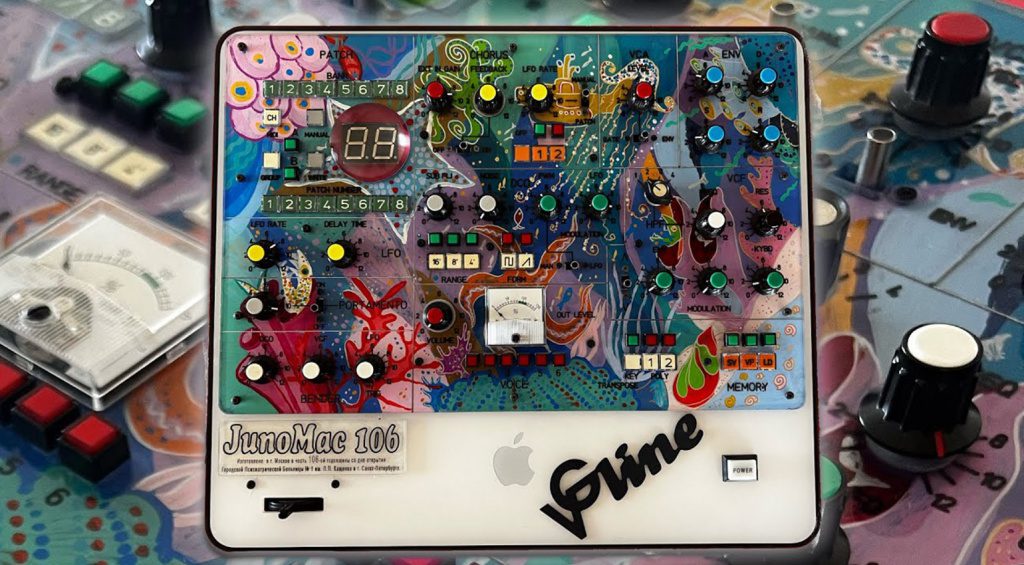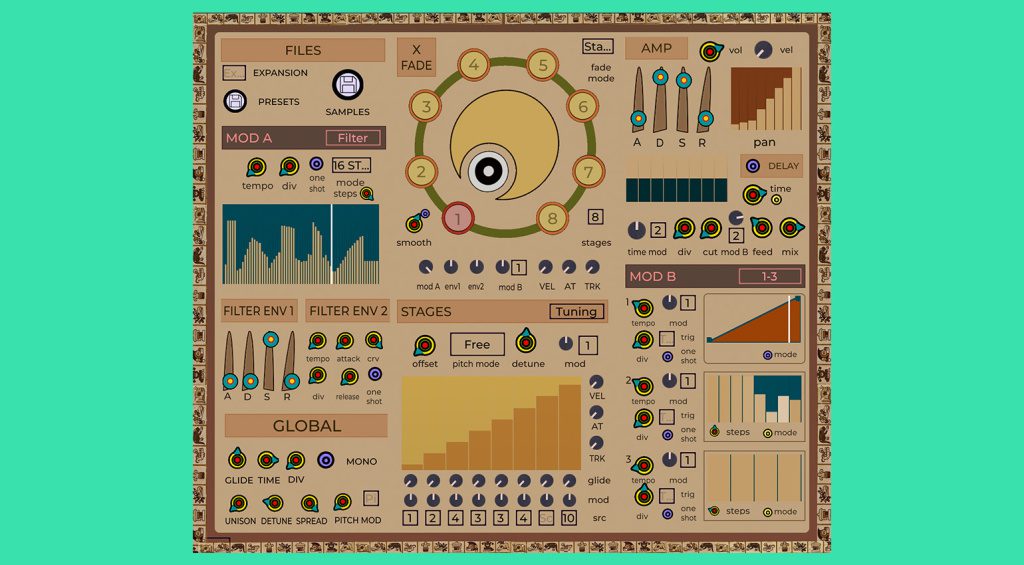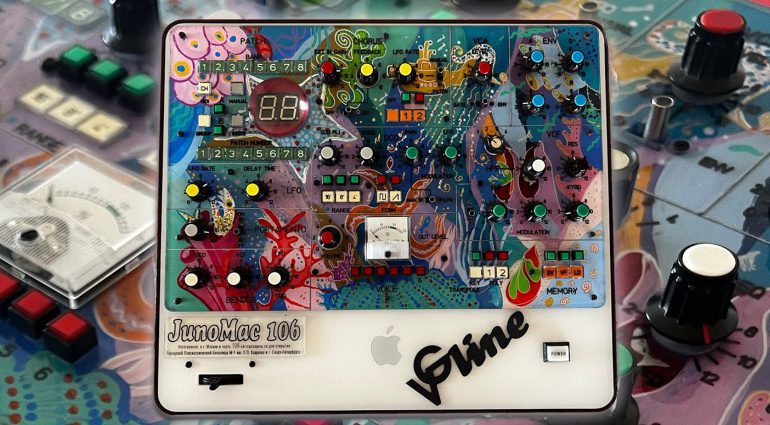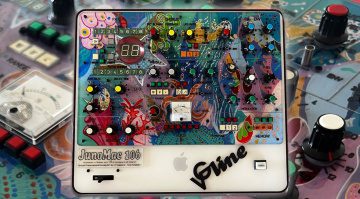Another week, another selection of synthy ephemera, including the JunoMac 106, a record that’s also a synthesizer and a BBC blast from the past.
I’m back on holiday cover duties again this week so let’s dive into some of the lesser-publicised goodies that didn’t quite make the headlines but are definitely worth dwelling on, if only to ask… “But why?”
JunoMac 106
Filed under “Things that shouldn’t exist in a sane world”, we find the JunoMac 106. Originally built three years ago by a company known as VG-Line, this Armenian company decided to take the chassis of a 2004 Apple iMac, the internals of a Roland Juno 106, add some psychedelic artwork and add speed and depth controls to the legendary chorus.
Well, I’m with Ryan on this one but I could also ask, “Why not?”. The fact is, I think the 106 is one of the nicest looking synths of that era. Sure, the 6 and 60, with their wooden end cheeks are lovely, but 1984’s 106 fully embraced the 80s with its style and stood out from the others which seemed to be stuck in the previous decade.

Equally, the 2004 iMacs have a certain ‘je ne sais quoi’ about them. The Centre for Computing History in Cambridge, U.K. has taken these cases and put a mirror where the screen once lived and hung them in the toilets above the sink. Genius!
And so I suppose this deserves similar praise. VG-Line have turned a classic synth design into something entirely unique that will no doubt be the talking point of whatever event you might see this at. And someone DID buy this, for a cool $3,800 USD!
I take my hat off to VG-Line and the JunoMac 106, and salute their individuality, bravado and “don’t give a damn” attitude!
A Place to Bury Strangers – Synthesizer
I’ve been collecting vinyl now since the mid 1970s. As a child, I would scour jumble sales and record stores for pieces of vinyl, simply to enrich my burgeoning desire to learn more about music. Over those years, I’ve come across a myriad unusual pieces. Picture discs, box sets, flexi-discs and sleeves that push the limitations of the 12″x12″ format.

But the latest release by ‘A Place to Bury Strangers’, entitled, quite appropriately, ‘Synthesizer’ is one of the most unique I have ever seen. Not only is the record called ‘Synthesizer’, the sleeve actually IS one! That’s got to challenge Peter Saville’s iconic cover for The Durutti Column’s debut album, ‘The Return of the Durutti Column‘ which was coated in sandpaper so as to ruin the sleeve of any album that was dared to be placed next to it. Situationism 1, Collector Angst 0.
The vision of Oliver Ackermann, whose band this is, decided to make the cover of the album into the basis for a noise synthesizer. You can buy the album and all the necessary components or on its own, allowing you to source all the parts. You will, of course, need to have a decent level of soldering and assembly skills.
Whilst the album may or may not be to your taste, i think we can all agree that this is a very cool idea.
You can buy the album in all of its variations here.
eclo.re player series vol.1
The idea of selling music in a form that allows the purchaser to remix and remodel the content is not a new one. With modern technology and the power of the internet, I’m surprised it hasn’t become more of a thing. I guess the concept flies in the face of copyright and ownership to the point that it makes it somewhat undesirable to do.
But that hasn’t stopped eclo.re from producing a range of interactive albums and E.P.’s that are embedded inside Reaktor 6 ensembles. Think of them as tiny DJ units with visualisations that allow the listener to interact and affect what they experience.
Loop. EQ, reverse, scratch and warp the sounds, these albums and E.P.’s were composed & produced by Sylvain Stoppani in the early 2000s and inhabit the realms of glitch and electronica, sonically. The first in the series, Vol.1, contains five collections with more scheduled to be released later.
Explore and buy the collection here.
Randomwaves Drumboy & Synthgirl
It seems that every five minutes there’s some new and exciting crowd-funding campaign launching for gear that claims to be able to revolutionise the way we make music with technology. Some succeed (Sonicware, for example) and others don’t (list too long to put here!) but as long as nobody gets ripped off financially, I’m happy with all these ideas bouncing around and gaining some traction.
One of the latest is from Randomwaves and it is for two similar, yet distinctly different, tools. Drumboy is a 24-bit drum machine with a colourful and information-rich display and a range of touch sensitive buttons to create, navigate and manipulate your beats.
Synthgirl is, as the name implies, a synthesizer. Also 24-bit, this wavetable synth occupies a case that is all but identical to the Drumboy. It can connect to the Drumboy to make a conceivably powerful music-making suite.
What makes these projects stand out is the fact that they are built on the STM32 platform. “So what?”, I hear you say. Well, I am reliably informed that this is an incredibly popular platform of choice for the open source, hacking and customisation community meaning that these devices could, potentially, be anything you want them to be.

Launching on Kickstart this coming September 20th, the other amazing thing about these cute little boxes is that they will only cost $149 each! I have a funny feeling that these could well be a very successful pair of musical tools!
modularsamples Quetzacoatl
Continuing on the open source theme, this is an interesting (and quite pretty) little project that I found over at github. Quetzacoatl is a software vector synthesizer with harmonic pitch controls. It features an eight-layer vector oscillator and a multimode harmonic filter.

There’s a selection of modulation options including an LFO, envelope generator, step and gate sequencer and it is stuffed full of a wide range of library sounds that have been sourced from many vintage synths.
Quetzacoatl alos allows the import of audio files in SFZ, WAV and AIFF formats so you can bring your own audio content in and process it through the engine. Built with the open source HISE framework, this free synthesizer is not only lovely to listen to, but it is also very easy on the eye.
Too many clever synth projects like this focus wholly on the technical functionality, forgetting that many of us musicians are often inspired by an attractive and intuitive interface. I hope to see this project grow in the months and years to come.
You can download Quetzacoatl here for use as a plugin across macOS, Linux and Windows.
The New Sound of Music
Rounding off this week’s journal is a brilliant blast from the past, courtesy of the BBC. I’m sure you won’t be surprised to learn that I remember watching this when it first aired in 1979. It undoubtedly fed my passion for electronic music making, as did many other exemplary pieces of reporting that the BBC did around that time.
For example, seeing the Series I Fairlight CMI on Tomorrow’s World, a science and technology show that preceded Top of the Pops on a Thursday night at 7pm kicked off a lifelong obsession with that instrument that persists to this day. I have four of the bloomin’ things in various parts of my house!
But this isn’t just a nostalgic blast from the past. This is a great way to educate the current generation on how far we have come in a relatively very short space of time. Michael Rodd, a BBC staple of the era, walks us through both music creation and recording technology, including plenty of time spent at the BBC Radiophonic Workshop.
One of the things I love about this show is that it features my dear friend and musical genius, David Vorhaus. This brilliant and lovely man is shown at work in his North London studio, a place I have been incredibly fortunate enough to spend time in, using his M.A.N.I.A.C. (Multiphasic ANalog InterActive Chromataphonic) sequencer and his VCS3, serial #001! And yes, the legendary Kaleidophone gets a showing too!
Sit back and enjoy!







